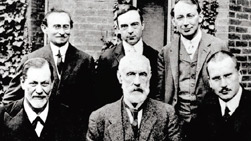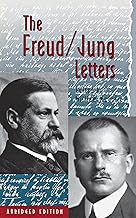Carl Jung Resources > Biography
Jung became familiar with the diseases only in contact with several masters: Bleuler, who was aware of his decision to come to Burgholzli, Pierre Janet, whose physiological theory impressed him deeply in the semester he spent in Salpetriere in the winter 1902-1903 and, eventually, Freud.
Since 1900, at Bleuler's request, Jung had a report to do on The Science of Dreams of the Vienna master [Freud].
In 1903 he discovered the consistency between Freud's theses and his own results on the free associations test. Nonetheless, he had to wait the year 1907 to personally
meet Freud. 13 hours of heated conversation proved to Jung that he was right to support the congress in Munchen (1906): "If what Freud says is true, then I am on his side. I
have no regard for a career where the truth is murdered and the research mutilated". From this moment on, Jung militated everywhere: in 1908, with Freud and Adler, at Salzburg Congress; in 1909, as
editor in chief of Journal of Psychoanalysis and Psychopathology run by Bleuler and Freud. In the same year, during his travel to the United States, at Clark
University, where he and Freud were both awarded the title Doctor Later on Freud would be disappointed in the man he had
chosen as his direct heir. Apparently, Jung was the first to be disappointed, during his meetings with "his foster father" in Vienna, in 1909 and 1910. During one such meeting,
Freud said that sexual theory was "a bulwark against... occultism", meaning the philosophy, religion and emerging parapsychology. Jung was also surprised by Freud's syncopes after their first controversy.
The controversies were provoked and partially compensated by the support Jung found in Theodore Flournoy (very much influenced by James's pragmatism) and the intellectual openness he believed to find in Creuzer, when
reading Symbolism and mythology of the ancient peoples (1909-1910). It was under the influence of these new masters that Jung would write
The content of this work does no longer correspond to the research of "the brilliant successor" he had published in
Diagnostic Studies on the Associations (1903), The Psychology of Dementia Praecox (1907) or The Content of The Psychoses (1908). The chapter on the incest could not have caused a "conflict
between schools" if it had not been based on "a conflict between personalities". However, the separation from Freud, consumed at the Congress in Munich in 1913, would
depend on the new orientation of Jung: he did not know to which direction the phantasms that assaulted him in that period would lead him. Later, Jung also abandoned his courses taught at the medical school.
His family and his private patients would be his only connection with the external world, in complete disagreement with his internal world, as he was on the brink of psychosis.
Jung was then 38 years old and had been fighting against his psychosis for five years, searching a remedy in the evil itself. --
|
© Copyright AROPA, 2025.

 The Freud-Jung letters provide the best resource ever showing the step-by-step development of the basic psychoanalytic ideas and concepts.
The Freud-Jung letters provide the best resource ever showing the step-by-step development of the basic psychoanalytic ideas and concepts.